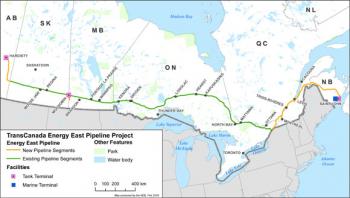Image Caption
The National Energy Board has launched an initiative to, in part, identify the best ways to collect oral traditional evidence as it moves forward with hearings on the TransCanada’s Energy East pipeline project.
These activities will be led by four board members, who are independent from the hearing panel. Alain Jolicoeur, Wilma Jacknife, Damien Côté and Ronald Durelle will be gathering comments by meeting with Indigenous peoples and through a new online engagement platform. The comment period ends on July 15.
The four board members hope to engage with many of the groups of Indigenous peoples who may be impacted by the project. This expanded engagement process is in keeping with the federal government’s new Interim Measures for Pipeline Review, which calls for “under(taking) deeper consultations with Indigenous peoples potentially affected by the project and provide funding to support these consultations.”
Relevant findings from these engagement efforts will be filed on the official record for the hearing panel to consider as they design the Energy East hearing process.
Energy East is a proposed 4,500-kilometre pipeline that would carry 1.1 million barrels of crude oil per day from Alberta and Saskatchewan to refineries in Eastern Canada and a marine terminal in New Brunswick.

